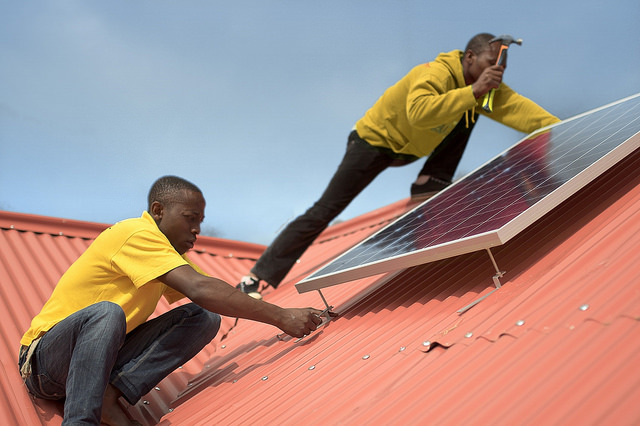Mainstreaming environment and climate change in the energy sector - Training

Related topics
Climate change, disaster risk reduction and desertification Environment and green economy Energydate: 28/03/2018
Nevertheless, such projects and programmes could improve their sustainability by better integrating (‘mainstreaming’) environment and climate change considerations in their design. To this end, an expert from DEVCO’s environment and climate change Mainstreaming Facility delivered a training session to EU officials and Project Managers on the topic as part of a five-day training course on energy and climate change, organised by DEVCO.
The training module highlighted constraints and opportunities, and presented the tools available to enhance mainstreaming.
Key recommendations that require attention in energy sector projects and programmes are:
- Ensure the climate proofing of infrastructure, which will be increasingly exposed to extreme weather conditions and, in some cases, to new high risk areas (e.g. exposure to coastal erosion due to sea level rise);
- Ensure that weather patterns expected under climate change are integrated in the design of energy projects to guarantee their feasibility, e.g. expected future water flows required for hydroelectric developments, wind speeds to design wind power systems, and higher temperatures affecting the efficiency of energy transmission and distribution systems;
- Use a Climate Risk Assessment (CRA) as a tool that can help identify climate risks and corresponding mitigation measures;
- Understand how environmental degradation can affect project feasibility, and integrate measures to address such issues. For example, including watershed protection measures to minimise accelerated sedimentation of hydroelectric dams;
- Pay attention to the potential adverse impacts on the environment, such as including waste management systems and strategies to deal with spent batteries from solar PV systems (which contain polluting heavy metals), or the management of PCBs (a persistent organic pollutant) contained in old transformers substituted under energy efficiency projects.
- Promote the integration of environment and climate change in national energy planning processes through the use of a Strategic Environmental Assessment (SEA);
- Identify opportunities to address the environmental impacts of energy production and use in partner countries, such as supporting the introduction of cleaner electricity production technologies and practices, fuel blending, etc.;
- Identify opportunities to contribute more significantly to climate change adaptation and to address health concerns associated with the energy sector, through the promotion, for example, of improved cooking stoves (to curb indoor air pollution) and of agroforestry systems (to reduce over-harvesting of firewood).
For methodological advice and further training on environment and climate change mainstreaming, contact Juan Palerm through the following email: EuropeAid-C2-MAINSTREAMING@ec.europa.eu
